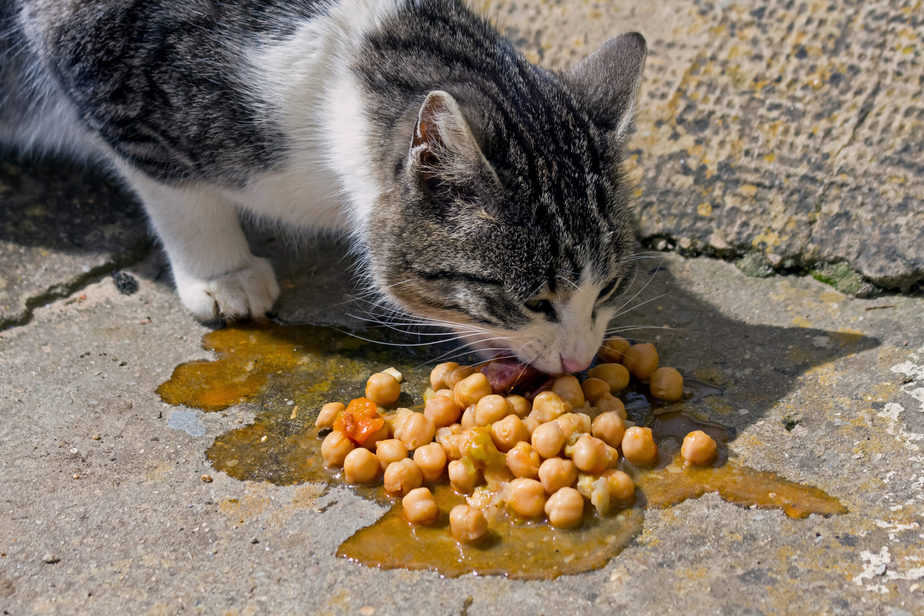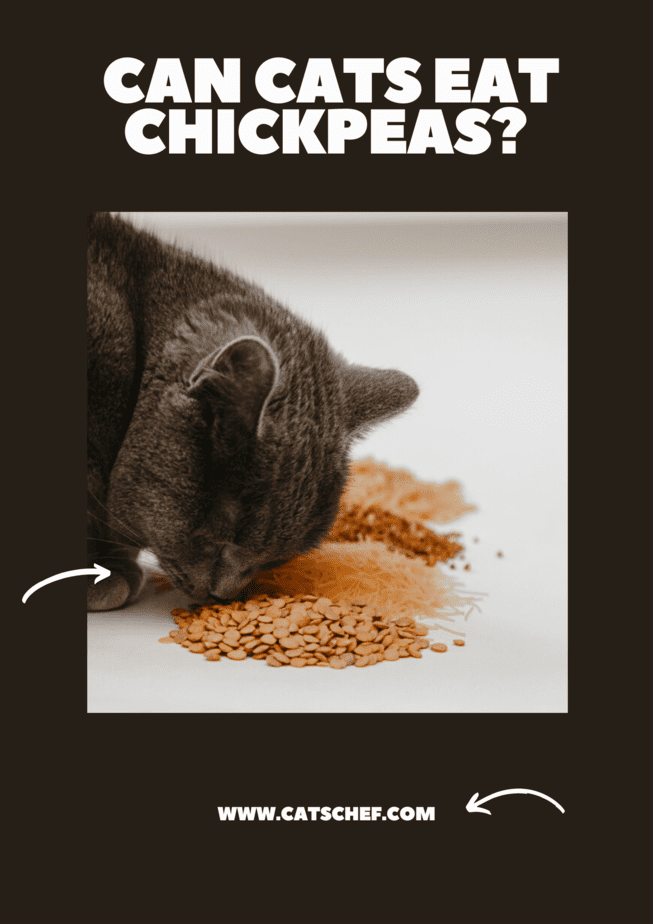As a cat owner, it’s natural to want to share your favorite foods with your furry companion. Chickpeas, in particular, have gained popularity in recent years as a healthy and protein-packed snack for humans. But before you toss a handful of these legumes to your cat, you may be wondering: are chickpeas bad for cats?
The answer is not a simple yes or no. While chickpeas themselves are not toxic to cats, there are several factors to consider before feeding them to your pet. As a professional writer, I have researched the potential risks and benefits of chickpeas for cats, and in this article, I will share my findings to help you make an informed decision about your cat’s diet.
Chickpeas are not toxic to cats but they are not recommended for their regular diet. Chickpeas are high in protein and fiber but cats are obligate carnivores and require a diet that is high in animal protein. Feeding your cat chickpeas may cause gastrointestinal problems like vomiting, diarrhea, and bloating. It is best to stick to a diet that is specifically made for cats.

Are Chickpeas Bad for Cats?
As a cat owner, you want to feed your furry friend only the best. While cats are obligate carnivores and require a meat-based diet, it’s not uncommon to wonder if other foods are safe for them to eat. Chickpeas, also known as garbanzo beans, are a popular legume used in many human dishes. But can cats eat them? Let’s find out.
What Are Chickpeas?
Chickpeas are a type of legume that originated in the Middle East and are now widely cultivated around the world. They are high in protein, fiber, and various vitamins and minerals, making them a popular ingredient in vegetarian and vegan diets. Chickpeas are commonly used in dishes such as hummus, falafel, and salads.
Benefits of Chickpeas for Cats
While cats are obligate carnivores and require a diet high in animal protein, small amounts of plant-based foods can be incorporated into their diet. Chickpeas can provide some nutritional benefits to cats, including:
- Protein: Chickpeas are a good source of protein, which is essential for cats to maintain muscle mass and support their immune system.
- Fiber: The fiber in chickpeas can help regulate a cat’s digestive system and prevent constipation.
- Vitamins and minerals: Chickpeas contain various vitamins and minerals, such as folate, iron, and magnesium, which can support a cat’s overall health.
Can Cats Eat Chickpeas?
While chickpeas can provide some nutritional benefits to cats, they are not essential to their diet and should be fed in moderation. Some cats may even have trouble digesting them, leading to gastrointestinal issues such as vomiting and diarrhea. It’s always best to consult with your veterinarian before adding any new food to your cat’s diet.
Chickpeas vs. Other Legumes
Chickpeas are not the only legume that can be incorporated into a cat’s diet. Other legumes, such as lentils and peas, can also provide some nutritional benefits to cats. However, it’s important to note that not all legumes are safe for cats to eat. For example, kidney beans and black beans can be toxic to cats and should be avoided.
Benefits of Lentils and Peas for Cats
Like chickpeas, lentils and peas are high in protein and fiber and can provide some nutritional benefits to cats. Lentils and peas can:
- Provide protein: Lentils and peas are a good source of plant-based protein, which can help cats maintain muscle mass and support their immune system.
- Regulate digestion: The fiber in lentils and peas can help regulate a cat’s digestive system and prevent constipation.
- Provide vitamins and minerals: Lentils and peas contain various vitamins and minerals, such as iron and potassium, which can support a cat’s overall health.
How to Feed Legumes to Cats
If you decide to incorporate legumes into your cat’s diet, it’s essential to do so in moderation. Legumes should not make up more than 10% of a cat’s diet and should always be cooked and properly prepared. Raw legumes can be difficult for cats to digest and can even be toxic.
Conclusion
In conclusion, while chickpeas can provide some nutritional benefits to cats, they are not essential to their diet and should be fed in moderation. It’s always best to consult with your veterinarian before adding any new food to your cat’s diet. Lentils and peas can also provide some nutritional benefits to cats and can be incorporated into their diet in moderation. Remember to always properly cook and prepare legumes before feeding them to your furry friend.
Frequently Asked Questions
Are chickpeas bad for cats?
Cats are obligate carnivores, which means that they require a diet that is high in protein and low in carbohydrates. While chickpeas are a good source of protein, they are also high in carbohydrates, and cats are not able to digest carbohydrates as well as they can digest protein. Therefore, feeding your cat chickpeas on a regular basis is not recommended, as it can lead to digestive issues and other health problems in the long run.
However, if you want to give your cat a treat once in a while, it is safe to give them a small amount of cooked chickpeas as a treat, provided that they do not have any underlying health issues that could be worsened by consuming chickpeas. Make sure that the chickpeas are cooked and mashed or pureed before giving them to your cat, as this will make it easier for them to digest.
What are the health benefits of chickpeas for cats?
Chickpeas are a good source of protein, fiber, vitamins, and minerals, which can provide some health benefits to cats. For example, the protein in chickpeas can help to support muscle growth and repair, while the fiber can help to improve digestion and prevent constipation. Chickpeas also contain vitamins and minerals such as folate, iron, and magnesium, which can help to support overall health and well-being in cats.
However, it is important to remember that cats have different nutritional needs than humans, and their bodies are not able to digest and absorb plant-based nutrients as well as animal-based nutrients. Therefore, while chickpeas can provide some health benefits to cats, they should not be relied on as a primary source of nutrition.
Can cats eat hummus made with chickpeas?
Hummus is a popular dip or spread that is made from chickpeas, tahini, olive oil, lemon juice, and garlic. While chickpeas are safe for cats to eat in moderation, hummus is not recommended for cats. This is because hummus contains other ingredients that can be harmful to cats, such as garlic and lemon juice, which can cause digestive issues and other health problems.
In addition, hummus is usually high in salt and fat, which can be unhealthy for cats, especially if they have any underlying health issues such as obesity or kidney disease. Therefore, it is best to avoid giving hummus to your cat, and stick to feeding them plain, cooked chickpeas as a treat instead.
What are the signs of chickpea allergy in cats?
While chickpeas are generally safe for cats to eat in moderation, some cats may be allergic to them. The signs of chickpea allergy in cats can include vomiting, diarrhea, itchy skin, and respiratory problems such as sneezing and coughing. If you notice any of these symptoms in your cat after feeding them chickpeas, it is important to stop feeding them chickpeas and consult your veterinarian for further advice.
Your veterinarian may recommend allergy testing to determine the cause of your cat’s symptoms, and they may also suggest a special diet or medication to help manage your cat’s allergies. In severe cases, your veterinarian may need to prescribe emergency treatment such as an epinephrine injection to help prevent anaphylaxis, a life-threatening allergic reaction.
What are some alternative sources of protein for cats?
If you are looking for alternative sources of protein for your cat, there are several options to consider. Some good sources of animal-based protein for cats include chicken, turkey, beef, and fish. These foods are high in protein and other essential nutrients that cats need to maintain their health and well-being.
If your cat has a food allergy or sensitivity, you may need to consider alternative protein sources such as venison, rabbit, or duck. There are also specialized diets available that are formulated to meet the nutritional needs of cats with specific health conditions, such as kidney disease or diabetes. Your veterinarian can help you choose the best diet for your cat based on their individual needs and preferences.

Can Cats Eat Chickpeas | Good or Bad for Your Cat
As a professional writer, it is important to understand the potential risks associated with feeding your cat certain foods. Chickpeas have become a popular ingredient in many human diets, but what about cats? While they are not toxic to cats, chickpeas are not the ideal food for them. As obligate carnivores, cats require a diet that is high in protein and low in carbohydrates. Chickpeas, on the other hand, are high in carbohydrates and low in protein.
If you do choose to feed your cat chickpeas, it should be done in moderation and as part of a well-balanced diet. It is important to remember that cats have different nutritional needs than humans and should not be fed the same diet. Consult with your veterinarian to determine the best diet for your cat, as they can provide personalized advice based on your cat’s age, weight, and overall health. In conclusion, while chickpeas are not toxic to cats, they should not be a staple in their diet and should only be given as an occasional treat.
